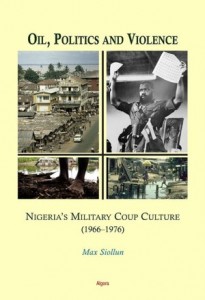Oil, Politics and Violence: Nigeria’s Military Coup Culture (1966 – 1976). Max Siollun. Algora Publishing; 268 pages; £22.51. Buy from Amazon.co.uk, Amazon.com
The story of Nigeria begins rather blandly with a colonial administrative decision to ‘unify’ over 250 ethnic groups. Forty-four years later, the amalgamated region became a self-governing state with a vague idea of nationhood. It should have been clear that these people – huddled together in what was later described as a ‘geographical expression’ – would, like a poorly planned consolidated company, stumble in finding prosperity. What may have been however unpredictable, was that its army would fall upon the people it was created to protect. Before its sixth anniversary, the army had executed two coups, killing its first Prime Minister and several others in what we must refer to as acts of genocide. The coups continued cyclically with only a few intervals until 1999. Max Siollun’s book offers a credible account of the muddle of fear, distrust and naïve idealism that set the foundation for governance in the sovereign state.
In seventeen chapters, ‘Oil, Politics and Violence’ provides an analysis of the first decade of military dictatorship in Nigeria. Building a background that helpfully evaluates the pre-1960 challenges of herding largely independent rival groups, Mr Siollun shows how religion and ethnicity were used to further divide the unwieldy tri-regional state. While these challenges further deteriorated after the Union Flag was lowered for the last time; religion was yet set aside to form political alliances to protect selfish interests and the corrupt.
Mr Siollun’s book presents corruption as the primary motivation for the January 1966 coup, dismissing the common notion that it was influenced by purely ethnic considerations; balanced by strong indications that high ranking Igbo officials may have been aware of it plans. For each of the four coups in that decade, Mr Siollun explores the characters of the actors, with insight that revaluates their roles as heroes or villains. It is remarkable that the history reads like the present with electoral fraud, greed, a government that takes an embarrassing percentage of the country’s expenditure.
‘Oil, Politics and Violence’ is not the first of the 1966-1976 accounts. Indeed, several memoirs explain their authors’ roles in the killings and power lust that transformed the military to jostling political foes. ‘Oil, Politics and Violence’ is however written by a non-participant, curating and comparing accounts, and attempting to resolve inconsistencies. Although Mr Siollun’s references are far from impeccable, his task may not have been an easy one. Data preservation in Nigeria has not always been considered significant – even the President’s Ph.D. thesis has become as elusive as the Holy Grail.
If there are any severe flaws, they are Mr Siollun’s writing style, grammatical lapses and typographical errors. There is also little analysis of the ‘oil’ economy from which he borrows the title or of the ‘violence’ of Nigerian civil war. Primarily, it is the book’s subtitle (Nigeria’s coup culture) that captures its contents. These omissions do not diminish the significance of the book as a valuable educational resource. Nigeria’s complex problems cannot be understood without an analysis of its shameful past. The book is a place to begin.

